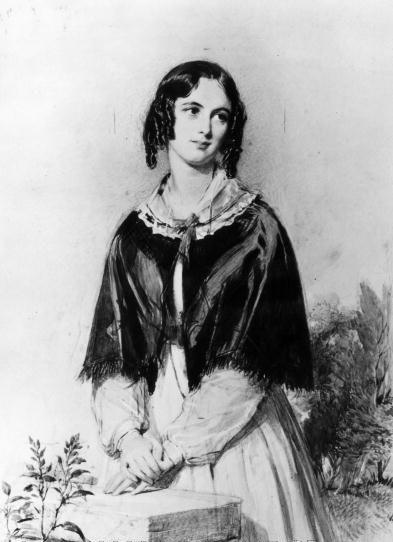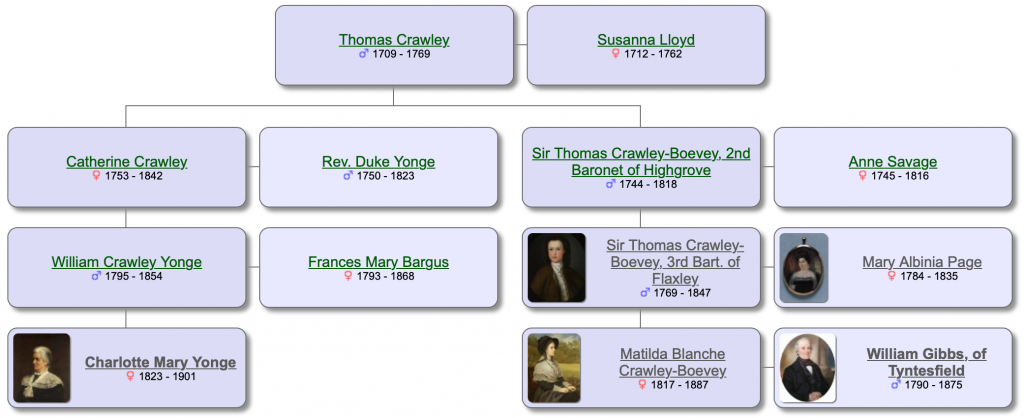Charlotte Mary Yonge – novelist of the Oxford Movement

I was recently contacted by the archivist of the Charlotte Mary Yonge Fellowship, who has written and researched about her, requesting:
I am interested in Matilda Blanche Gibbs, wife of William of Tyntesfield, in particular in relation to her friendship with her cousin the author Charlotte Mary Yonge. There are some references in Charlotte Yonge’s letters (now available online) to visits to Tyntesfield, etc, but we don’t really know very much about her friendship with Blanche.
Charlotte Mary Yonge (1823–1901) was an English novelist, who wrote in the service of the church. Her abundant books helped to spread the influence of the Oxford Movement and show her keen interest in matters of public health and sanitation.
She was born into a religious family in Otterbourne, Hampshire. Devoted to the High church, she was much influenced by John Keble, Vicar of Hursley from 1835, a near neighbour and one of the leaders of the Oxford Movement. Yonge was herself sometimes referred to as “the novelist of the Oxford Movement”. Beginning writing in 1848 she published about 160 works, chiefly novels, and was much admired by leading writers of her day, including Lewis Carroll, George Eliot and C.S. Lewis.
Matilda Blanche Gibbs was not only a good friend of Charlotte, but also a second cousin through her equally religious Crawley-Boevey family.
The Yonges and Crawleys were serial contractors of marriages to their first cousins. Three of Charlotte’s father’s siblings were married to Crawley siblings, and on her mother’s side there was an equal profusion of Colborne/ Bargus/ Yonge intermarriages. On a previous post I have described the numerous marriages between Gibbses and Crawley-Boeveys. No wonder her parents were violently opposed to cousin marriages. An interesting reflection of society at the time … where ‘dating’ was restricted to ‘approved’ families – pre Tinder!

The CMY archivist advise that a Charlotte Mary Yonge exhibition is currently up in Otterbourne church and will there for some time. Matilda Blanche Gibbs endowed Otterbourne when it became a separate parish. CMY had intended to do it, but in the event had to use her savings to bail out her brother when he got into financial difficulties. The Charlotte Mary Yonge Fellowship is joining up with the Hampshire Field Club on 24 June to visit Otterbourne and Hursley. Winchester cathedral has a special evensong for CMY on 11 August, and in the first Sunday in September, Otterbourne church is having an evensong for her.
Historian cousin Nicholas had also contacted me a couple of years ago about an impromptu visit that he made to Otterbourne church, near Winchester, where he had struck up a conversation with the Vicar about the Victorian novelist and promoter of the Oxford Movement, Charlotte Mary Yonge, buried not twenty feet from the church door. The Yonges were good philanthropists to the church and village. The Church Advowson thus being purchased by Matilda Blanche Gibbs to separate Otterbourne from the Hursley Parish – where tumbledown Dick (Cromwell) is buried upside down. The vicar told him that they are mounting a small exhibition just inside the entrance of Otterbourne church in honour of Charlotte Yonge. At Hursley two miles away lived Sir William Heathcote, 5th Bt. of Hursley Park, a grand edifice. It was Sir William who invited John Keble to be the Vicar of the Hursley village. Keble accepted and is buried with his wife in the churchyard. There are extraordinary Oxford Movement connections between the Gibbs-Heathcote-Yonge-Herbert and Nightingale families who were all influencing each other with John Keble as the Figurehead.
The powers of internet search enable me to quickly search for “Gibbs” within Charlotte’s online letters, which show that she was well acquainted with several members of our Gibbs family:
- To Henry Hucks Gibbs Nov 25th 1861 ” My dear Henry… You and your kind wife will, I am sure be glad to hear that a very fine little boy made his appearance here on Saturday evening – one day less than 13 months younger than his sister; who has not quite decided whether he is a doll or not… “
- To Anne Yonge July 25th 1863 “…we must hold to our former plan of going to St Dunstans on Monday as the Gibbses [HH and Louisa] are very kind and real friends and will let us be quiet, and indeed there are more things to be bought before we can go home….”
- To Alexander Macmillan July 12th 1864 “We go … on August 1st to H.H. Gibbs’s Esq St Dunstan’s Regents Park, and whilst I am there I shall hope to make another descent upon you, and resume my MS, and have a talk…“
- To Louisa Anne Gibbs Dec 1st 1869 ” My dear Louisa, I am so much obliged to you for that letter ... “
- To Edith Sophia Jacob Oct 11th 1869 “… I go on Wednesday to Wm Gibbs’s Esq, Tyntesfield, Bristol to stay a week .…”
- To Sir John Taylor Coleridge Jan 17th 1872 “… You do not know of a clergyman who would go abroad with Mr William Gibbs’s son Martin & read for Holy Orders with him. £200 a year & all expenses paid. Poor Martin cannot go on at Cambridge… “
[see previous blog article Henry Martin Gibbs – Letters home from the Peruvian Sierra with Arthur Heathcote] - To Mary Anne Dyson Apr 6 1875 ” … I heard this morning that good old Mr. Gibbs [William] is gone – on Friday night – his flowers fresh in our church … “
- To Mary Yonge May 1st 1876 ” … when I went to the 7.30 service I met dear Mrs Gibbs [Matilda Blanche] at the gate of Keble college with her sweet calm face, and thoughtful eyes – I was to glad to have seen her … “
Aug 17th 1876 “… I had a happy time at Tyntesfield,- The new Chapel was opened. It holds 80 people and will serve the people in the lodges, & gardens.- who are very far from Church … “ - To the Hon. Laura Elizabeth Palmer Aug 13th 1874 “… I am now at Mr Edward Freeman’s, but tomorrow I go to Mr Gibbs’s at Tyntesfield and thence to Heaths Court... “
- To Elizabeth Barnett 29 September 1887 “… This is the dear Mrs. Gibbs’s burial day [Matilda Blanche]… We knew what was coming for nearly a month; Mrs. Gibbs herself had found something wrong in the spring. She would not, however, let her sons know till her eldest son and his wife came back from being in Scotland, and by that time in August dropsy was setting in. I do not think there was much acute pain till towards the end, and then it was allayed by morphia, and up to the last three weeks she was able to be taken to her beautiful chapel, which stands on arches so as to be level with the upstair rooms. There was restlessness and oppression, but exhaustion came on, and she sank in about a week, always sensible, and having thought of everybody and everything, quite happy and peaceful. I certainly never saw her like in many respects, there was such a conscientious humility and wisdom in all her largeness of heart, and such a grace and exquisite taste, together with self-denial. That beautiful house was like a church in spirit, I used to think so when going up and down the great staircase like a Y. At the bottom, after prayers, Mr. Gibbs in his wheeled chair used to wish everybody good-night, always keeping the last kiss for ‘his little maid,’ Albinia, with her brown eyes and rich shining hair. She went a year before the old man- now fourteen years ago- but the dear Blanche did revive wonderfully, throwing herself into all her good works, and making her house such a place of rest and refreshment… “
- To Mary Yonge Sept 18th 1889 ” … I have had a very pleasant time between Barrow Court – Martin Gibbs’s place, and Somerleaze ... “
- To Laura Valentine May 19th 1893 “… I shall be at H H Gibbs’s, Esq, St Dunstan’s Regents Park, N W until Saturday … I have a little niece to shew all the wonders of London to … “
- To Ethel Romanes May 1894 “… A very dear friend of mine, Mrs. Gibbs, whose name you know in connection with Keble College, used to say that the losses of her husband and several of her children had made ‘Therefore with Angels and Archangels,’ etc., more to her than ever … “
- To Helena Mary Heathcote May 5 1898 ” … Lady Crawley, the mother of Mrs William Gibbs, who had the power only in that generation of the family laughed at it as imagination, and I believe Mrs Gibbs inherited it, but never spoke of it... “

Comments
Charlotte Mary Yonge – novelist of the Oxford Movement — No Comments
HTML tags allowed in your comment: <a href="" title=""> <abbr title=""> <acronym title=""> <b> <blockquote cite=""> <cite> <code> <del datetime=""> <em> <i> <q cite=""> <s> <strike> <strong>